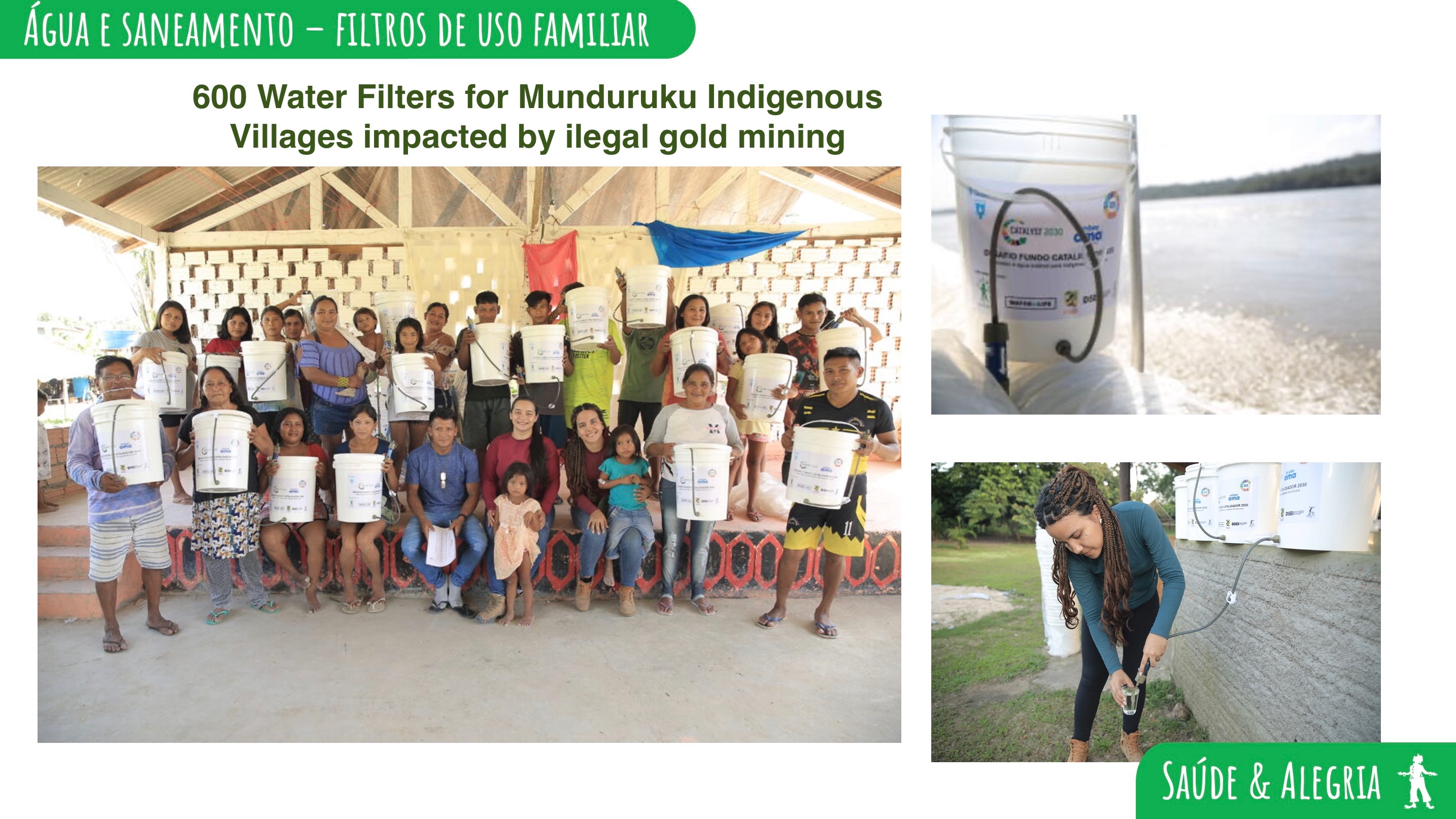Progress report for
EXPANSION OF ACCESS TO QUALITY WATER IN INDIGENOUS VILLAGES IMPACTED BY ILLEGAL MINING IN THE AMAZON

Achievement at a glance
The initiative enabled immediate improvements in access to quality water for 89 Munduruku villages impacted by illegal mining on the Tapajos River, benefiting 6 thousand indigenous people through WASH workshops, distribution of filters, implementation of new water supply systems and improvement of old systems that needed repairs.Challenges faced in implementation
The initial expected execution deadline had to be extended as we had an extreme drought in the Amazon in 2023 caused by El Nino, which made access to communities difficult.Furthermore, we also had a change in federal management, which, although it improved with a new government that was more attentive to the Amazon region and indigenous policies, also ended up requiring more time with the change of regional leaders responsible for the partner bodies with the project.
Therefore, the end of execution, previously scheduled for September 2023, was extended until the first half of 2024.
Next Steps
The initiative is part of a public-private partnership, where the idea is not to replace the government but to join efforts in facing the difficult challenge of getting assistance to remote areas of the Amazon.It focused on remote and isolated areas, where the logistical costs of assistance services are very high in view of the limited budget of government agencies, which end up having insufficient reach in these villages.
In view of this, the proposal had opened up the opportunity for the development of adapted, demonstrative, resolute, and replicable solutions and social technologies with lower cost and greater positive impact in a co-creation process with indigenous and public agents.
The result will be, in addition to improvements in the living conditions of the directly benefited indigenous populations, the availability of these social technologies as references for dissemination in other areas via public policies.
They will also be available through the Projeto Saúde e Alegria for other organizations, public or private, in Brazil or other nations interested in replicating them in the respective regions with similar contexts.
CONTINUITY OF COOPERATION WITH PUBLIC AUTHORITY
As an example, given the good results of this initiative, cooperation with public authorities was deepened to join efforts in improving the quality of life of these Munduruku indigenous populations.
Currently, this partnership is expanding the number of villages that benefit from investments in WASH, such as the renovation of four water supply systems in villages in the middle Tapajos region.
And the actions are also extending to other projects, such as communication and digital inclusion (with the provision of internet access centers in isolated areas) and also to health projects (with the electrification of Basic Care Units, allowing conservation of vaccines, telemedicine services, etc.).
Beneficiaries
The beneficiaries of this initiative are indigenous people of the Munduruku Territory. A population of about 14,000 indigenous people lives in small villages between 10 and 100 families. They fish, hunt, and plant for subsistence. Most of them lack the facilities of energy, sanitation, communication, and access to quality water. They live in communities impacted by illegal mining, a region of conflict and challenges. In 2018, the Federal Police released a report in which it was estimated that mining dumps around seven million tons of waste per year into the Tapajos River, with mercury being the main metal found. When released into the river, mercury is transported through the food chain, contaminating fish, which are the indigenous people's main source of food. Contamination by mercury in the human body can cause sensory-motor-neurological problems and other serious illnesses, affecting the nervous systems of adults and newborns. A study with the Munduruku people published in 2020 by Fiocruz in partnership with WWF-Brazil indicated that all research participants were exposed to mercury. Of every ten participants, six had mercury levels above safe limits; about 57.9% had levels above 6 µg/g, which is the maximum safety limit established by health agencies. Unfortunately, public services are insufficient in these areas of difficult access. Several diseases are caused by contaminated water. Both public bodies and indigenous villages need support to face all the social and environmental problems in this region. Because of this, the commitment has focused on wash activities. Since the beginning of its implementation (October 2022), it has been bringing benefits in improving access to quality water for more than 6 thousand indigenous people from 89 villages served in the middle and upper Tapajos regions.
Actions
Since the beginning of its implementation (October 2022), it has worked intensely to bring wash investments to the Munduruku indigenous villages impacted by illegal mining.Since then, it has been possible to achieve results above expectations:
1) DISTRIBUTION OF MEMBRANE WATER FILTERS (NANOTECHNOLOGY):
- 31 collective use filters delivered to indigenous schools – 2206 people served
- 600 family bucket filters delivered – 600 families (3767 people)
- Total of 89 villages served – 5,973 people benefited
2) IMPLEMENTATION OF NEW WATER SUPPLY SYSTEMS:
- 3 complete water supply systems with well drilling, wooden elevated, distribution network and solar energy – 27 families (131 people) benefited
- 2 water supply systems implemented by public partners (counterpart)
3) RENEWAL, IMPROVEMENT, CLEANING, SOLAR ENERGY in previously implemented water systems:
- 8 villages benefited from solar energy for water pumping and improvements to hydraulic installations – 674 families (2787 people)
- 2 villages served with well cleaning – 37 families (187 people)
- 1 village served with the construction of 7 bathrooms – 9 families (47 people)
- 7 Health Centers rehabilitated into WASH facilities - 3323 people
4) TRAINING:
- Electricity workshops for community multiplier agents (maintenance and basic repairs of photovoltaic systems)
- Basic WASH workshops for maintenance and repairs of implemented water systems
